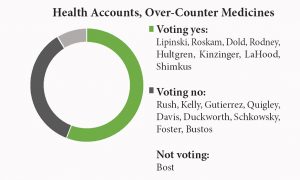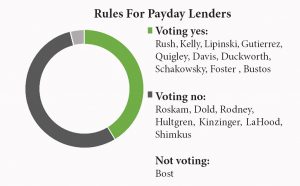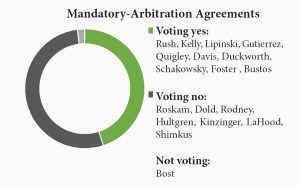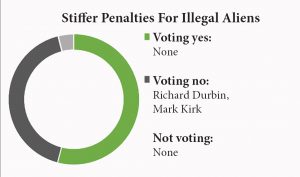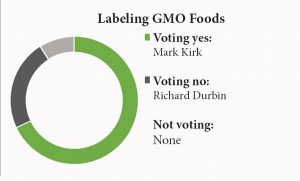How They Voted: Illinois representatives’ votes in Congress
Chronicle Media — July 10, 2016UNITED STATES HOUSE OF REPRESENTATIVES
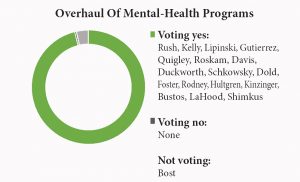 Overhaul Of Mental-Health Programs: The House on July 6 passed, 422 for and two against, a bill (HR 2646) that would expand Medicare and Medicaid coverage, including prescription-drug coverage, of mental-health treatments and services. Overall, the bill would make major changes in federal programs and agencies that help Americans cope with mental illness and substance abuse. By expanding entitlement spending, the bill is projected to add at least $3 billion and possibly tens of billions of dollars to federal debt through fiscal 2025.
Overhaul Of Mental-Health Programs: The House on July 6 passed, 422 for and two against, a bill (HR 2646) that would expand Medicare and Medicaid coverage, including prescription-drug coverage, of mental-health treatments and services. Overall, the bill would make major changes in federal programs and agencies that help Americans cope with mental illness and substance abuse. By expanding entitlement spending, the bill is projected to add at least $3 billion and possibly tens of billions of dollars to federal debt through fiscal 2025.
In part, the bill would address the nation’s shortage of hospital beds and professional staff for psychiatric care; remove criminal incarceration from mental-health hospitals; ease privacy rules to spur information-sharing for diagnoses and treatments; elevate the standing of mental-health programs in the Department of Health and Human Services and develop improved preventive measures and early interventions against diseases including schizophrenia.
Tim Murphy, R-Pa., said the bill “allows parents and caregivers to help with care. It increases the number of crisis mental-health beds. It drives evidence-based care. It builds on existing mental-health and substance-abuse parity laws. It brings accountability to federal grant programs.”
No member spoke against the bill.
A yes vote was to send the bill to the Senate.
Health Accounts, Over-Counter Medicines: Voting 243 for and 164 against, the House on July 6 passed a GOP-sponsored bill (HR 1270) that would allow individuals to purchase over-the-counter medicines with funds from their Health Savings Accounts (HSAs). The bill would add $6.6 billion to federal debt over 10 years. Existing law permits individuals to couple HSAs with high-deductible health plans. HSA contributions are tax-free, withdrawals can be used only to pay qualified medical expenses and account balances are invested and carried forward year to year. HSAs are key to House Republicans’ newly released plan to replace the Affordable Care Act.
Michael Burgess, R-Texas, said today’s law needs fixing because it “decreases access to reasonable over-the-counter medications and discourages people from taking control of saving for their healthcare needs.”
Jim McGovern, D-Mass., said the bill would “disproportionately benefit high-income people, increase taxes for low- and middle-income people and do nothing to improve the quality of or address the underlying cost of health care.”
A yes vote was to send the bill to the Senate, where it appears likely to fail.
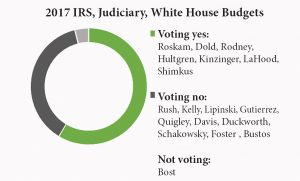 2017 IRS, Judiciary, White House Budgets: Voting 239 for and 185 against, the House on July 7 passed a fiscal 2017 appropriations bill (HR 5485) that would provide $10.9 billion for the Internal Revenue Service, $9.2 billion for the General Services Administration, $7 billion for the federal judiciary, $1.5 billion for the Securities and Exchange Commission, $883 million for the Small Business Administration, $725 million for the District of Columbia, $692 million for the executive office of the president and $315 million for the Federal Communications Commission, among other outlays.
2017 IRS, Judiciary, White House Budgets: Voting 239 for and 185 against, the House on July 7 passed a fiscal 2017 appropriations bill (HR 5485) that would provide $10.9 billion for the Internal Revenue Service, $9.2 billion for the General Services Administration, $7 billion for the federal judiciary, $1.5 billion for the Securities and Exchange Commission, $883 million for the Small Business Administration, $725 million for the District of Columbia, $692 million for the executive office of the president and $315 million for the Federal Communications Commission, among other outlays.
The bill would end a requirement that corporations disclose certain campaign-finance activity to the SEC; prohibit the IRS from issuing a rule on the political activities of tax-exempt 501 (c)(4) organizations; suspend the FCC’s “net neutrality” rule until court challenges are resolved; bar the FCC from regulating broadband rates and put the Consumer Financial Protection Agency budget under congressional control.
Michael Burgess, R-Texas, said it is wrong that the Consumer Financial Protection Bureau “draws its funds on autopilot directly from the Federal Reserve,” therefore bypassing congressional oversight.
Jim McGovern, D-Mass., said the bill “undermines key elements of the Dodd-Frank financial reform; it diminishes women’s access to legal health services (and) meddles in the District of Columbia’s internal affairs….”
A yes vote was to pass the bill.
Rules For Payday Lenders: Voting 182 for and 240 against, the House on July 7 defeated a Democratic bid to advance a Consumer Financial Protection Bureau rule, now in draft stage, that would begin federal regulation of companies that provide high-interest “payday” loans and similar credit secured by the borrower’s future paychecks. The amendment was offered to HR 5485 (above), which would prohibit the bureau from spending its funds to put the rule into effect.
Terri Sewell, D-Ala., said it was important “to rein in predatory practices utilized by payday lenders across this country.”
Patrick McHenry, R-N.C., said the amendment risks “cutting off access to credit for millions of Americans….Where will consumers that need these loans go next?”
A yes vote was to advance a proposed payday-lending rule.
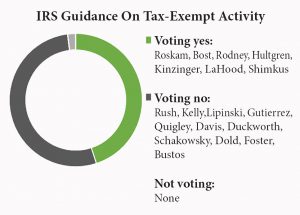 IRS Guidance On Tax-Exempt Activity: Voting 183 for and 239 against, the House on June 7 defeated a Democratic amendment to bolster IRS scrutiny of 501(c)(4) social-welfare groups. Under the Supreme Court’s Citizens United ruling, these non-profit groups can receive contributions and engage in political activity. But to qualify for tax-exempt status, they cannot devote a majority of their activities to politics. The underlying bill (HR 5485) would prohibit the IRS from issuing guidance to help groups comply with this requirement. It reflects a belief by many Republicans that the IRS gives undue scrutiny to organizations on the right including Tea Party groups.
IRS Guidance On Tax-Exempt Activity: Voting 183 for and 239 against, the House on June 7 defeated a Democratic amendment to bolster IRS scrutiny of 501(c)(4) social-welfare groups. Under the Supreme Court’s Citizens United ruling, these non-profit groups can receive contributions and engage in political activity. But to qualify for tax-exempt status, they cannot devote a majority of their activities to politics. The underlying bill (HR 5485) would prohibit the IRS from issuing guidance to help groups comply with this requirement. It reflects a belief by many Republicans that the IRS gives undue scrutiny to organizations on the right including Tea Party groups.
Xavier Becerra, D-Calif., said the IRS needs to “give us clarity on who can and who cannot use tax-exempt laws to try to be a social-welfare organization.”
Anders Crenshaw, R-Fla., said the IRS uses its oversight “to single out individuals and groups of individuals based on their political philosophy….”
A yes vote backed IRS scrutiny of certain tax-exempt organizations.
Disclosure Of Corporate Donations: Voting 186 for and 236 against, the House on July 7 defeated a Democratic amendment in support of the Securities and Exchange Commission requiring corporations to disclose their political contributions to 501(c)(4) social-welfare organizations (preceding issue). The SEC is planning a rule that would require publicly traded companies to disclose their political spending to the SEC and thus to shareholders. The underlying bill (HR 5485) would kill the rule by starving it of funds.
Daniel Kildee, D-Mich., said “American citizens have the right to know how corporations are spending money to affect the outcome of elections.”
Anders Crenshaw, R-Fla., said: “Let’s call the amendment what it is. It is an end run around the Supreme Court’s Citizens United decision.”
A yes vote backed the SEC’s planned rule on political disclosures.
Mandatory-Arbitration Agreements: Voting 181 for and 236 against, the House on July 7 defeated a Democratic amendment in behalf of draft Consumer Financial Protection Bureau rules to govern mandatory-arbitration language in consumer contracts including credit-card agreements. When they agree to such language, customers usually forego their right to seek redress in court and, instead, commit to having disputes settled by arbitration panels.
Keith Ellison, D-Minn., said: “Forced arbitration clauses are a perfect example of an unfair system. Powerful corporations rig the rules to make it more difficult for people to hold companies accountable for wrongdoing.”
Steve Womack, R-Ark., said: “Arbitration empowers individuals. Injured parties can obtain fair resolution of disputes without the need of an attorney. But many oppose this approach, particularly plaintiffs’ attorneys….”
A yes vote was backed a draft rule to limit mandatory-arbitration agreements.
UNITED STATES SENATE
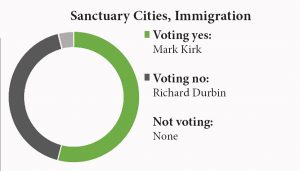 Sanctuary Cities, Immigration: The Senate on July 6 failed, 53-44, to reach 60 votes for advancing a bill (S 3001) that would deny economic-development and community-block grants to “sanctuary” cities or states that refuse to act as an arm of federal immigration enforcement. Officials in sanctuary cities say that to assist the Department of Homeland Security in this fashion would undercut community-policing efforts that depend on rapport with immigrant populations.
Sanctuary Cities, Immigration: The Senate on July 6 failed, 53-44, to reach 60 votes for advancing a bill (S 3001) that would deny economic-development and community-block grants to “sanctuary” cities or states that refuse to act as an arm of federal immigration enforcement. Officials in sanctuary cities say that to assist the Department of Homeland Security in this fashion would undercut community-policing efforts that depend on rapport with immigrant populations.
Richard Durbin, D-Ill., said the bill “would criminalize, with mandatory minimum sentencing, conduct that would affect thousands of people who have crossed over the border into the United States undocumented.”
Ted Cruz, R-Texas, said: “A real president, faithful to the Constitution, would end sanctuary cities by cutting off money to any jurisdiction openly defying federal immigration law.”
A yes vote was to pass the bill.
Stiffer Penalties For Illegal Aliens: Voting 55 for and 42 against, the Senate on July 6 failed to reach 60 votes needed to advance a bill (S 2193) that would increase from two years to five years the maximum sentence for persons convicted of illegally entering the U.S. The bill also would require mandatory minimum sentences of five years for undocumented aliens with aggravated felony records who illegally re-enter the U.S. after deportation. The bill failed, in part, because it runs counter to bipartisan congressional efforts to reduce prison overcrowding resulting from the imposition of long minimum sentences for less-serious crimes.
Ted Cruz, R-Texas, said it is time “to confront the sobering issue of illegal aliens, many of whom have serious criminal backgrounds and yet are allowed to illegally re-enter this country with impunity.”
Patrick Leahy, D-Vt., said the bill appears to be “inspired by Donald Trump and the anti-immigrant rhetoric that is fueling his campaign….pushing hard-working immigrants back into the shadows.”
A yes vote was to advance the bill.
Labeling GMO Foods: Voting 63 for and 30 against, the Senate on July 7 passed a bill (S 764) that would require food labels on consumer shelves to list genetically-modified organisms (GMOs) under standards set by the U.S. Department of Agriculture. The bill would override GMO label laws enacted by states.
Debbie Stabenow, D-Mich., said bill gives consumers first-time access “to information about their food through a mandatory, nationwide label for food products with GMOs.”
Bernie Sanders, I-Vt., said: “When parents go to the store and purchase food, they have the right to know what is in the food their kids are going to be eating.”
A yes vote was to send the bill to the House.
— How They Voted: Illinois representatives’ votes in Congress —

